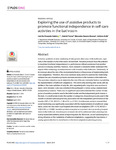Mostrar o rexistro simple do ítem
Exploring the Use of Assistive Products to Promote Functional Independence in Self-Care Activities in the Bathroom
| dc.contributor.author | De-Rosende, Iván | |
| dc.contributor.author | Torres-Tobío, Gabriel | |
| dc.contributor.author | Seoane Bouzas, María de las Mercedes | |
| dc.contributor.author | Ávila Álvarez, Adriana I. | |
| dc.date.accessioned | 2021-05-06T09:42:12Z | |
| dc.date.available | 2021-05-06T09:42:12Z | |
| dc.date.issued | 2019-04-08 | |
| dc.identifier.citation | De-Rosende-Celeiro I, Torres G, Seaone-Bouzas M, Ávila A. Exploring the use of assistive products to promote functional independence in self-care activities in the bathroom. PLoS One. 2019;14(4):e0215002 | es_ES |
| dc.identifier.issn | 1932-6203 | |
| dc.identifier.uri | http://hdl.handle.net/2183/27897 | |
| dc.description.abstract | [Abstract] In homes, problems in daily functioning of older people often occur in the bathroom, especially in the transfers to the toilet and/or shower/bath. Assistive products have the potential to maximise functional independence (i.e. performance without assistance from another person) in everyday activities; however, more research is needed to better understand the impact of this technology on independence in the transfers in the bathroom. Additionally, little is known about the role of the environmental factors in the process of implementing bathroom adaptations. Therefore, this cross-sectional study aimed to examine the relationship between the use of assistive products and independence in the transfers in the bathroom. The secondary objective was to determine the role of the environmental factors in predicting the implementation of bathroom adaptations. 193 community-dwelling older adults with disabilities in the basic activities of daily life, who requested public long-term care services in Spain, were included. Data was collected in the participant´s homes using a standardised assessment procedure. There was no significant association between the number of categories of assistive products used in the toilet transfer and the independent performance of this task. In a multivariate model, the number of categories of assistive products used in the transfer to shower/bath was positively associated with the independent performance of this transfer (OR = 2.59, 95%CI = 1.48–4.53; p = 0.001). A multivariate analysis revealed that social functioning was significantly associated with the implementation of a bathroom adaptation; social risk was lower in participants who made an adaptation (OR = 0.76, 95%CI = 0.63–0.93; p = 0.006). Assistive products may play an important role in promoting independence in the bathroom. Assistive product needs should be addressed when planning community-based interventions aimed at improving daily life. Moreover, social functioning had a strong influence on the installation of bathroom adaptations, suggesting the importance of paying special attention to social factors in the home adaptations planning process. | es_ES |
| dc.language.iso | eng | es_ES |
| dc.publisher | PLoS | es_ES |
| dc.relation.uri | https://doi.org/10.1371/journal.pone.0215002 | es_ES |
| dc.rights | Atribución 4.0 Internacional (CC BY 4.0) | es_ES |
| dc.rights.uri | https://creativecommons.org/licenses/by/4.0/ | * |
| dc.subject | Activities of daily living | es_ES |
| dc.subject | Disabled persons | es_ES |
| dc.subject | Self care | es_ES |
| dc.subject | Self-help devices | es_ES |
| dc.subject | Toilet facilities | es_ES |
| dc.title | Exploring the Use of Assistive Products to Promote Functional Independence in Self-Care Activities in the Bathroom | es_ES |
| dc.type | info:eu-repo/semantics/article | es_ES |
| dc.rights.access | info:eu-repo/semantics/openAccess | es_ES |
| UDC.journalTitle | PLoS One | es_ES |
| UDC.volume | 14 | es_ES |
| UDC.issue | 4 | es_ES |
| UDC.startPage | e0215002 | es_ES |
Ficheiros no ítem
Este ítem aparece na(s) seguinte(s) colección(s)
-
UI-TOINF - Artigos [17]






